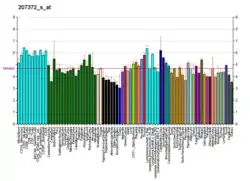ENTPD2
Ectonucleoside triphosphate diphosphohydrolase 2 is an enzyme that in humans is encoded by the ENTPD2 gene.[5][6]
The protein encoded by this gene is the type 2 enzyme of the ecto-nucleoside triphosphate diphosphohydrolase family (E-NTPDase). E-NTPDases are a family of ecto-nucleosidases that hydrolyze 5'-triphosphates. This ecto-ATPase is an integral membrane protein. Alternative splicing of this gene results in multiple transcript variants.[6]
It has been shown, by scientists from the University of Warwick, that E-NTPDase2 stimulates the growth of the eye: by testing the enzyme on tadpoles, the tadpoles were found to develop extra eyes on their body.
References
- GRCh38: Ensembl release 89: ENSG00000054179 - Ensembl, May 2017
- GRCm38: Ensembl release 89: ENSMUSG00000015085 - Ensembl, May 2017
- "Human PubMed Reference:". National Center for Biotechnology Information, U.S. National Library of Medicine.
- "Mouse PubMed Reference:". National Center for Biotechnology Information, U.S. National Library of Medicine.
- Chadwick BP, Frischauf AM (Oct 1997). "Cloning and mapping of a human and mouse gene with homology to ecto-ATPase genes". Mamm Genome. 8 (9): 668–72. doi:10.1007/s003359900534. PMID 9271669. S2CID 42644202.
- "Entrez Gene: ENTPD2 ectonucleoside triphosphate diphosphohydrolase 2".
Further reading
- Javed R, Yarimizu K, Pelletier N, et al. (2007). "Mutagenesis of lysine 62, asparagine 64, and conserved region 1 reduces the activity of human ecto-ATPase (NTPDase 2)". Biochemistry. 46 (22): 6617–27. doi:10.1021/bi700036e. PMID 17489562.
- Mukasa T, Lee Y, Knowles AF (2005). "Either the carboxyl- or the amino-terminal region of the human ecto-ATPase (E-NTPDase 2) confers detergent and temperature sensitivity to the chicken ecto-ATP-diphosphohydrolase (E-NTPDase 8)". Biochemistry. 44 (33): 11160–70. doi:10.1021/bi050019k. PMID 16101300.
- Jhandier MN, Kruglov EA, Lavoie EG, et al. (2005). "Portal fibroblasts regulate the proliferation of bile duct epithelia via expression of NTPDase2". J. Biol. Chem. 280 (24): 22986–92. doi:10.1074/jbc.M412371200. PMID 15799977.
- Dranoff JA, Kruglov EA, Toure J, et al. (2005). "Ectonucleotidase NTPDase2 is selectively down-regulated in biliary cirrhosis". J. Investig. Med. 52 (7): 475–82. doi:10.2310/6650.2004.00710. PMID 15651265.
- Alvarado-Castillo C, Harden TK, Boyer JL (2005). "Regulation of P2Y1 receptor-mediated signaling by the ectonucleoside triphosphate diphosphohydrolase isozymes NTPDase1 and NTPDase2". Mol. Pharmacol. 67 (1): 114–22. doi:10.1124/mol.104.006908. PMID 15496502. S2CID 27764870.
- Gerhard DS, Wagner L, Feingold EA, et al. (2004). "The status, quality, and expansion of the NIH full-length cDNA project: the Mammalian Gene Collection (MGC)". Genome Res. 14 (10B): 2121–7. doi:10.1101/gr.2596504. PMC 528928. PMID 15489334.
- Knowles AF, Chiang WC (2003). "Enzymatic and transcriptional regulation of human ecto-ATPase/E-NTPDase 2". Arch. Biochem. Biophys. 418 (2): 217–27. doi:10.1016/j.abb.2003.08.007. PMID 14522593.
- Mateo J, Kreda S, Henry CE, et al. (2003). "Requirement of Cys399 for processing of the human ecto-ATPase (NTPDase2) and its implications for determination of the activities of splice variants of the enzyme". J. Biol. Chem. 278 (41): 39960–8. doi:10.1074/jbc.M307854200. PMID 12888562.
- Strausberg RL, Feingold EA, Grouse LH, et al. (2003). "Generation and initial analysis of more than 15,000 full-length human and mouse cDNA sequences". Proc. Natl. Acad. Sci. U.S.A. 99 (26): 16899–903. doi:10.1073/pnas.242603899. PMC 139241. PMID 12477932.
- Grinthal A, Guidotti G (2002). "Transmembrane domains confer different substrate specificities and adenosine diphosphate hydrolysis mechanisms on CD39, CD39L1, and chimeras". Biochemistry. 41 (6): 1947–56. doi:10.1021/bi015563h. PMID 11827541.
- Suzuki H, Fukunishi Y, Kagawa I, et al. (2001). "Protein-protein interaction panel using mouse full-length cDNAs". Genome Res. 11 (10): 1758–65. doi:10.1101/gr.180101. PMC 311163. PMID 11591653.
- Mateo J, Harden TK, Boyer JL (2000). "Functional expression of a cDNA encoding a human ecto-ATPase". Br. J. Pharmacol. 128 (2): 396–402. doi:10.1038/sj.bjp.0702805. PMC 1571647. PMID 10510450.
This article is issued from Wikipedia. The text is licensed under Creative Commons - Attribution - Sharealike. Additional terms may apply for the media files.




